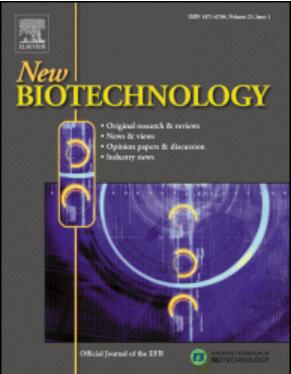MAGMA: Microbial and Algal Growth Modeling Application
IF 4.5
2区 生物学
Q1 BIOCHEMICAL RESEARCH METHODS
引用次数: 0
Abstract
Kinetic modeling of biochemical reactions and bioreactor systems can enhance and quantify knowledge gained from cell culture experiments and has many applications in bioprocess design and optimization. The Microbial and Algal Growth Modeling Application (MAGMA) is a user-friendly MATLAB-based software for streamlining the development of kinetic models for various bioreactor systems. This study details the MAGMA workflow by demonstrating the creation of kinetic models with systems of ordinary differential equations (ODEs), model fitting by solving inverse problems, statistical evaluation of model fitting quality, and visual display of simulation results. Two case studies (microalgae growth and Rhodococcus jostii plastic fermentation) have been provided to validate MAGMA applicability. It also includes a proof-of-concept for utilizing OpenAI GPT-4o’s graph interpretation capability to automate tabulation of time course culture data from figures/plots in relevant literature, which can be used to calibrate model parameters. MAGMA is open source and compiled with MATLAB Runtime.
MAGMA:微生物和藻类生长模型应用。
生化反应和生物反应器系统的动力学建模可以增强和量化从细胞培养实验中获得的知识,在生物工艺设计和优化方面有很多应用。微生物和藻类生长模型应用程序(MAGMA)是一种基于 MATLAB 的用户友好型软件,可简化各种生物反应器系统动力学模型的开发。本研究详细介绍了 MAGMA 的工作流程,演示了利用常微分方程系统创建动力学模型、通过解决逆问题进行模型拟合、模型拟合质量的统计评估以及模拟结果的可视化显示。提供了两个案例研究(微藻生长和红球菌塑料发酵),以验证 MAGMA 的适用性。它还包括一个概念验证,即利用 OpenAI GPT-4o 的图形解释功能,从相关文献的数字/图中自动制表时间过程培养数据,这些数据可用于校准动力学模型和参数。MAGMA 是一款开源软件,与 MATLAB Runtime 一起编译,无需 MATLAB 许可即可使用。
本文章由计算机程序翻译,如有差异,请以英文原文为准。
求助全文
约1分钟内获得全文
求助全文
来源期刊

New biotechnology
生物-生化研究方法
CiteScore
11.40
自引率
1.90%
发文量
77
审稿时长
1 months
期刊介绍:
New Biotechnology is the official journal of the European Federation of Biotechnology (EFB) and is published bimonthly. It covers both the science of biotechnology and its surrounding political, business and financial milieu. The journal publishes peer-reviewed basic research papers, authoritative reviews, feature articles and opinions in all areas of biotechnology. It reflects the full diversity of current biotechnology science, particularly those advances in research and practice that open opportunities for exploitation of knowledge, commercially or otherwise, together with news, discussion and comment on broader issues of general interest and concern. The outlook is fully international.
The scope of the journal includes the research, industrial and commercial aspects of biotechnology, in areas such as: Healthcare and Pharmaceuticals; Food and Agriculture; Biofuels; Genetic Engineering and Molecular Biology; Genomics and Synthetic Biology; Nanotechnology; Environment and Biodiversity; Biocatalysis; Bioremediation; Process engineering.
 求助内容:
求助内容: 应助结果提醒方式:
应助结果提醒方式:


